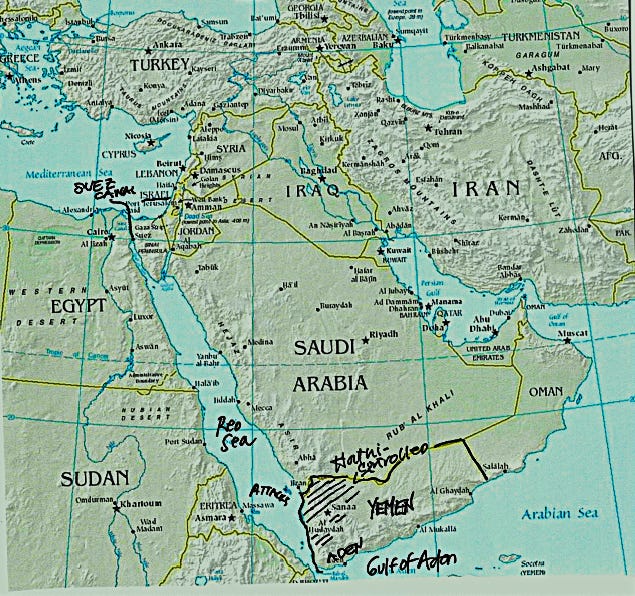Why is the US Striking the Houthis in Yemen - and what does it mean?
Do strikes on Yemen portend a US-Israeli attack on Iran?
After a brief cooling off — well, as that simmering region goes — the Middle East is again turning into a war zone. Israel’s renewed attacks on Hamas, which it accuses of not turning over hostages, are shredding the fragile ceasefire, violent clashes keep erupting at the border of Syria and Lebanon, and Turkey keeps bombing Kurdish areas in Iraq — for starters.
And now the US is striking the Houthis in Yemen, who in a show of solidarity with Hamas, have been attacking vessels in the Red Sea — the strait that ships pass through entering or leaving the crucial Suez Canal — since October 2023. As noted in an earlier post, it’s as if the Iran-backed Houthis were itching to become a target.
“We’re doing the entire world a favor by getting rid of these guys and their ability to strike global shipping,” Secretary of State Marco Rubio said on Sunday during a “Face the Nation” appearance. The most recent air and naval strikes have killed over 50 in Yemen since March 15.
From October 2023 to January 2024, the Houthis damaged vessels, entirely sunk two ships, set a Greek-flagged oil tanker ablaze — the fires continued for weeks — and hijacked an Israeli-owned vessel taking its Filipino crew hostages for 15 months. As a result, traffic through the crucial Suez Canal has dropped by 55% as ships are forced to take the long way around Africa.
The latest strikes aren’t the first ordered by the Pentagon: Along with the UK and Israel, the US hit Houthi targets hundreds of time through 2024 — and unlike Hezbollah and Hamas, both of which have been weakened over the past year, the Houthis just keep on ticking.
Houthis also walked away from attacks by neighboring Saudi Arabia — who launched 25,000 air strikes on them starting in 2015 — seemingly without a scratch. Seven years later, after the Houthis began attacking their oil installations, Saudi Arabia finally shrugged and negotiated a peace deal.
The Yemeni government, which is Sunni dominated and has been in a civil war with the Houthis since 2014, has gone after the Shia troublemakers for decades. That hasn’t gone well: the Houthis have snatched more and more territory in western and northern Yemen, including capital Sana’a, forcing the shaky government to hightail it to Aden in 2015.
The Houthis, who want to install a Shia Islamic government and rule Yemen, now control territory where over half of Yemenis live.
But this round of US attacks on Yemen appears different.
“HELL WILL RAIN DOWN UPON YOU LIKE NOTHING YOU HAVE EVER SEEN BEFORE,” Trump posted on Truth Social this weekend.
For one thing, the Trump administration, which designated the militia as a foreign terrorist group, is targeting Houthi leaders along with strategic sites and vows to keep pummeling until the Houthis relent. For another thing, Trump is holding Iran responsible, as it has long funded (and armed) the Shia group.
Russia is also closely aligned with the Houthis — probably arming them as well as passing info about ships in the Red Sea. Apparently in exchange, the Houthis have recruited hundreds of Yemenis to work in Russia; after luring them with the promise of non-military jobs, Moscow is using them to fight in Ukraine. According to Fatima Abo Alasrar of the Middle East Institute, the Houthis have shifted “from an Iranian proxy to a Russian asset.”
Since Trump, who dropped out of the previous Iran nuclear deal in 2018, is now pressuring Iran, which isn’t the least bit interested, to renegotiate another deal to stifle their ability to make nuclear weapons — and threatening military action if Iran doesn’t come to the table, the attacks on Yemen may be viewed through another prism.
I suspect that these more intense strikes on the Houthis are designed to secure the waters not only for commercial vessels, but also for warships to more easily transit the Suez Canal and Red Sea to potentially battle Iran.
Israeli Prime Minister Netanyahu has been lobbying the Trump administration to support — and join in on — an attack to decimate Iran’s nuclear capabilities, long viewed by Israel as an existential threat. And intelligence reports say that Iran is getting very close to producing nuclear weapons.
To me, the attacks on the Houthis are simply clearing the way for the US to link arms with Israel for a major attack on Iran — if not an all-out war. And who knows where it will spin out from there.






Nice job! Yemen is a hellish place. Sudan, Ethiopia, and Yemen—the perfect calamity trio. Reading Robert D. Kaplan’s “The Loom of Time,” I noticed a window of opportunity for the Middle East with the imminent collapse of the Islamic Republic of Iran. He pointed out a concerning trend among analysts: China’s insatiable hunger for hydrocarbons. This will bring substantial financial and business opportunities, and potentially military presence, if the United States continues to abandon this region.